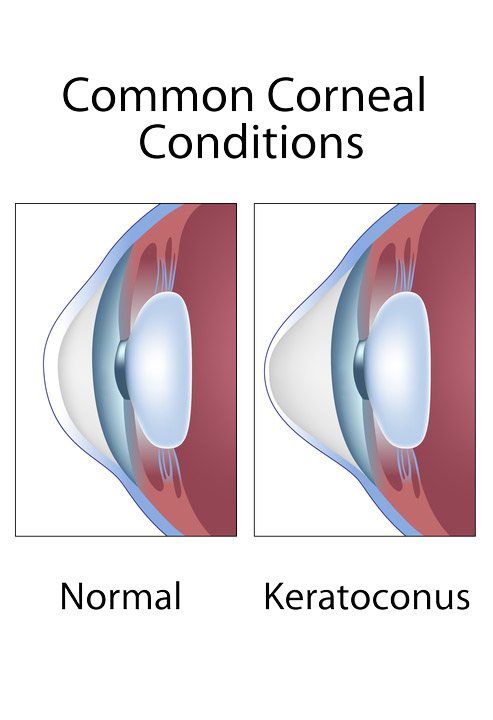Keratoconus

Keratoconus is a condition of the eye in which the cornea becomes thin and misshapen. Whereas a normal cornea is round, a cornea affected by keratoconus will begin to bulge and take on a cone-like shape. Keratoconus is believed to be linked to a congenital problem. Though it may take many years before the condition starts to affect sight, the tendency to develop the disease is believed to be present at birth. Researchers are unsure of the exact cause of keratoconus though it seems to be associated with a collagen defect.
Did you know…
that people who develop keratoconus are often people who have been diagnosed with nearsightedness? Since a nearsighted person’s vision tends to worsen over time, resulting in astigmatism. Keratoconus can run in families, so children of parents with the disease should be screened periodically beginning at age 10. Early diagnosis is possible with regular screening though it is often not until the teen years that keratoconus is first diagnosed.
Frequently Asked Questions
What are they symptoms of keratoconus?
Initial symptoms of keratoconus initially include blurred vision. However, many people eventually begin to experience nighttime sight disruptions, such as halos or glare. Anyone who does not achieve 20/20 sight with the aid of corrective lenses may have keratoconus and should contact their ophthalmologist for an exam. Various tests, including corneal topography, slit-lamp examination and pachymetry, are all used to diagnose and measure the progression of keratoconus in its various stages
What treatments are available for keratoconus?
Most people with keratoconus are treated with rigid gas-permeable contact lenses designed to compensate for the abnormal curvature of the eye. Certain corrective vision treatments are also available to help delay or completely prevent the need for greater interventions, such as corneal transplantation. Examples include keratoplasty to reshape the cornea and corneal implants.
Is there anything I can do to prevent keratoconus?
Though there is nothing you can do to prevent the condition, there are steps you can take to keep keratoconus from rapidly developing in your eyes. Eye allergies have been linked to rapid development of keratoconus, as has frequent eye rubbing. By treating eye allergies and avoiding eye rubbing, it may be possible to slow the progression of keratoconus.
